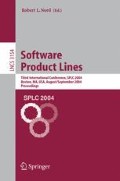Abstract
We study the generative development of control programs for families of embedded devices. A software family is described by a single common model and restriction specifications for each of the family members. The model and the specifications are used in the automatic generation of restricted programs. We describe an application of the process of modeling reactive systems with statecharts. A trace inclusion refinement relation is established for automatically generated family members, inducing a behavioral inheritance hierarchy over the generated programs.
Access this chapter
Tax calculation will be finalised at checkout
Purchases are for personal use only
Preview
Unable to display preview. Download preview PDF.
References
Berry, G.: The foundations of Esterel. In: Plotkin, G., Stirling, C., Tofte, M. (eds.) Proof, Language and Interaction. Essays in Honour of Robin Milner, Foundations of Computing Series, pp. 425–454. The MIT Press, Cambridge (2000)
Bulyonkov, M.A.: Polyvariant Mixed Computation for Analyzer Programs. Acta Informatica 21(5), 473–484 (1984)
Czarnecki, K., Bednasch, T., Unger, P., Eisenecker, U.: Generative programming for embedded software: An industrial experience report. In: Batory, D., Consel, C., Taha, W. (eds.) Generative Programming and Component Engineering (GPCE), Pittsburgh, PA, USA, October 2002. LNCS, vol. 2487, pp. 156–172. Springer, Heidelberg (2002)
Czarnecki, K., Eisenecker, U.W.: Generative Programming: Methods, Tools, and Applications. Addison-Wesley, Reading (2000)
Engels, G., Heckel, R., Küster, J.M.: Rule-based specification of behavioral consistency based on the UML meta-model. In: Gogolla, M., Kobryn, C. (eds.) UML 2001. LNCS, vol. 2185, pp. 272–286. Springer, Heidelberg (2001)
Harel, D.: Statecharts: A visual formalism for complex systems. Science of Computer Programming 8, 231–274 (1987)
Harel, D., Kupferman, O.: On object systems and behavioral inheritance. IEEE Transactions on Software Engineering 28(9), 889–903 (2002)
Harel, D., Pnueli, A.: On the development of reactive systems. In: Apt, K.R. (ed.) Logic and Model of Concurrent Systems, October 1985. NATO ASI, vol. 13, pp. 477–498. Springer, Heidelberg (1985)
Hatcliff, J., Mogensen, T.Æ., Thiemann, P. (eds.): Partial Evaluation: Practice and Theory. DIKU 1998 International Summer School. LNCS, vol. 1706. Springer, Copenhagen (1999)
Hoare, C.A.R.: Communicating Sequential Processes. International Series in Computer Science. Prentice Hall, Englewood Cliffs (1985)
IAR Inc. IAR visualSTATE® . http://www.iar.com/Products/VS/
Jones, N.D., Gomard, C.K., Sestoft, P.: Partial Evaluation and Automatic Program Generation. International Series in Computer Science. Prentice Hall, Englewood Cliffs (1993), http://www.dina.kvl.dk/sestoft/pebook
Burch, J.R., Clarke, E.M., McMillan, K.L., Dill, D.L., Hwang, L.J.: Symbolic Model Checking: 1020 States and Beyond. In: Fifth Annual IEEE Symposium on Logic in Computer Science, Washington, D.C, pp. 1–33. IEEE Computer Society Press, Los Alamitos (1990)
Nielsen, J.B.L.: Verification of Large/State Event Systems. PhD thesis, Technical University of Denmark (April 2000)
Object Management Group. OMG Unified Modelling Language specification (1999), http://www.omg.org
Parnas, D.L.: On the design and development of program families. IEEE Transactions on Software Engineering SE-2(1), 1–9 (1976)
SCOPE: A statechart compiler (2003), http://www.mini.pw.edu.pl/wasowski/scope
Tip, F.: A survey of program slicing techniques. Journal of Programming Languages 3(3), 121–189 (1995)
Wąsowski, A.: On Efficient Program Synthesis from Statecharts. In: ACM SIGPLAN Languages, Compilers, and Tools for Embedded Systems (LCTES), San Diego, USA, June 2003, ACM Press, New York (2003)
Wąsowski, A., Sestoft, P.: On the formal semantics of visual- STATE statecharts. Technical Report TR-2002-19, IT University of Copenhagen (September 2002)
Ziadi, T., Jézéquel, J.-M., Fondement, F.: Product line derivation with UML. In: Software Variability Management Workshop, University of Groningen Departement of Mathematics and Computing Science (February 2003)
Author information
Authors and Affiliations
Editor information
Editors and Affiliations
Rights and permissions
Copyright information
© 2004 Springer-Verlag Berlin Heidelberg
About this paper
Cite this paper
Węsowski, A. (2004). Automatic Generation of Program Families by Model Restrictions. In: Nord, R.L. (eds) Software Product Lines. SPLC 2004. Lecture Notes in Computer Science, vol 3154. Springer, Berlin, Heidelberg. https://doi.org/10.1007/978-3-540-28630-1_5
Download citation
DOI: https://doi.org/10.1007/978-3-540-28630-1_5
Publisher Name: Springer, Berlin, Heidelberg
Print ISBN: 978-3-540-22918-6
Online ISBN: 978-3-540-28630-1
eBook Packages: Springer Book Archive

